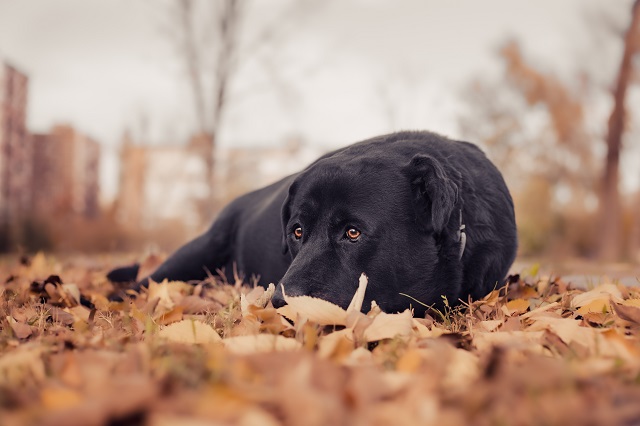Dogs are similar to humans in more ways than people seem to realize. Dogs are capable of experiencing emotions just like humans do. It’s common for Labradors to express happiness, sadness, fear, and anger. These can be observed by observing their body language.
Whenever your Labrador acts listless or even depressed for a long period, you may be concerned that something is wrong. All dogs, including Labradors, can be depressed for several reasons. In addition to experiencing anxiety and depression, they can also experience mental health issues.
Sadness can be a normal emotion when your dog loses a companion, has an upheaval of its routine, or recently lost its owner. Changes in the environment, such as moving or bringing home a newborn, can also trigger it. There may be times when your dog is upset because you scolded him.
After reading that, you might be wondering how you can tell if your dog is simply sad or if he is suffering from depression. There may be a time when you wonder what you can do or whether you should seek professional help. If so, you’ve come to the right place.
How Do You Know if Your Labrador is Sad?
It’s not uncommon to look at your furry friend and think, My Labrador looks sad. The causes listed above are all known to cause sadness. A dog can be sad from time to time, just like a person. At some point, this sadness may even become depressed, which will need to be treated. In general, it’s pretty easy to identify sadness, even in labs, that naturally look sad with their droopier faces.
Signs Your Labrador is Sad
Labs are no different from other dogs when it comes to sadness. Observing your dog’s body language should also give you a sense of what’s going on in their head. Even though dogs don’t cry, you will be able to see right through their body language as you learn to understand them. Typical signs of sadness in Labs include:
| Whining or whimpering | Not engaging with things they normally enjoy |
| Alterations to sleep patterns or behaviors | Seeming lethargic |
| Squinting eye | Refusing to eat |
When Sadness Becomes Depression In Labradors
Sadness is a normal reaction for dogs, but it is usually fleeting. Some dogs experience temporary sadness from time to time. I mean, don’t you get sad sometimes yourself? Nevertheless, sadness is different from depression. If your dog is depressed, its sadness does not go away. Although dogs rarely suffer from depression, it can occur.
Those dogs that seem to be down for an extended period are considered depressed. There may not be any participation in their favourite activities, or they may refuse food entirely. The symptoms of depression are much more severe and pervasive than general sadness. You cannot just coax your Labrador out by giving them treats or taking them for a walk.
What’s Depression in Labrador’s?
It is important to note that depression in dogs can severely impact their health and behavior, requiring additional treatment. Dogs can also be treated with antidepressant medications, just like humans.
Why is My Labrador Depressed?
It might seem strange to you that dogs would be depressed. Besides, they have fun, food, shelter, and built-in companionship with their owners. You shouldn’t think that your dog is depressed because you are the owner. Even if they are well taken care of, they may become depressed.
| Grief: Dogs who are grieving are more likely to suffer from depression. Losing a companion, such as another dog, a special toy, or a human member of the household due to their moving out or passing away can cause grief. |
| Environmental Changes: Depression can also be caused by changes in the environment. Your dog may become depressed if you move to a new area after living somewhere most of their life. When anxiety doesn’t clear up within a few days after moving to a new environment, it could mean your Labrador is depressed. |
| Seasonal Changes: Do you know what seasonal affective disorder is? It might not have occurred to you if you have never been to the Pacific Northwest. Those who live in areas that receive little sunlight during the winter are commonly afflicted by seasonal depression. Dogs are sensitive, and they sometimes go through depression as the seasons change. |
| Trauma: Trauma may also contribute to depression. Trauma in dogs may come in many forms, including being attacked by humans or animals, having something bad happen, or seeing harm or being harmed. |
Signs of Depression In My Labrador
Primary signs of depression in dogs will last longer than a couple of days. These include:
| Hiding | Licking paws |
| Sleeping more | Aggression |
| Losing interest in eating | Digging through the ground, walls, or furniture |
| Destructive behaviors | Losing interest in fun activities |
Is My Labrador Bored?
It is often mistaken for depression or sadness when dogs are bored, which is much more common. If there are no activities to keep your dog busy, it may get bored just like you would. During the wild, animals have to hunt for food. As a result, they are quite active. Even though our domesticated friends aren’t as energetic as their ancestors, they still need to be active.
Even though your Labrador is already fairly low-energy in adulthood, they still require some activity. The general rule is that a tired dog is a well-behaved dog. However, a bored dog is likely to cause destruction. Whenever your Lab begins to seem bored, you need to keep it busy.
The most common sign is destructive behavior, such as knocking over the trash or chewing through your furniture. They destroy whatever they can to keep themselves stimulated. If you want to prevent such destructive behavior, you should provide a suitable outlet for your dog’s energy.

Can Other Factors Make My Labrador Sad?
If your dog seems sad for some reason, you might be wondering if there is anything else going on. That’s completely possible! Just like people, dogs are complex animals. There are several reasons why your Lab might be sad, including you denying its desires. Here are some common causes:
| Separation anxiety | Stress |
| Illness or injury | Having to come inside |
| Are you leaving the house | Refusing to share something with your dog |
| Wanting to play when you can’t |
Any number of reasons might make your Labrador sad, but as long as it does not cause long-term harm, it is okay. There are things you can do at home to help your sad dog without going to the vet if you aren’t concerned. However, a professional opinion can’t do any harm if you are worried about your dog’s health.
What Can I Do to Help My Labradors Sadness
Seeing a veterinarian is the first step if you’re concerned. Start setting a schedule up as soon as you notice your dog is depressed. By doing this, you can confirm that the behaviors you observe do not have any underlying causes.
Your dog deserves predictability, so schedule the same things at the same time every day. Life is less depressing when it is predictable since your dog knows what to expect at any moment.
Adding some fun spontaneity will also make your Lab have a good time. Taking a long walk together is a great way to do this. Get a Puppuccino. Take a walk outdoors. Even getting a new treat or toy can be fun and lift spirits. Dogs benefit from getting outside time. You must be patient with your dog if they are sad or depressed. They need time to grieve and process what happened. And don’t forget to give a little extra love when you can to cheer up your Lab!
When Should I Take Them to the Vet?
If you notice that your Lab is depressed for more than a few days, we recommend visiting the vet for a quick checkup. This is because several symptoms for depression also overlap with symptoms for dogs that may need medical attention. It’s important to have your vet confirm that your Lab is healthy if they do not eat, are tired or lack energy.
Conclusion
There will sometimes be genuine sadness, so try not to worry about it. It takes a bit of time for most labs to get out of their funk. The good news is that treatment is available for dogs who have been diagnosed with depression. Your vet can help you put the pep back in your Lab’s step by advising you accordingly.


